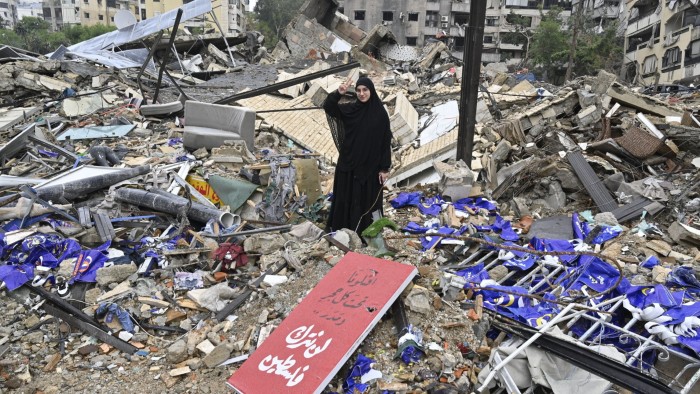Unlock the Editor’s Digest for free
Roula Khalaf, Editor of the FT, selects her favourite stories in this weekly newsletter.
After more than a year of unimaginable death and destruction in the Middle East, there is finally a moment of hope. At 4am local time on Wednesday, a US-brokered ceasefire came into effect to halt the war between Israel and Lebanese militant group Hizbollah. The agreement — which envisages Hizbollah pulling back from Lebanon’s southern border, and invading Israeli forces withdrawing and ending a relentless bombing campaign — is fragile and will face myriad tests.
The responsibility for ensuring that Hizbollah abides by the terms rests with Lebanon’s government, its army and UN peacekeepers, none of which have in the past been able or willing to rein in the militants. The responsibility for ensuring that Israel sticks to the terms resides with Benjamin Netanyahu, the prime minister, who will have to contain his far-right allies and avoid striking again at any pretext.
It is in the interests of all sides for the ceasefire to last beyond the initial 60-day period. Hizbollah has taken its heaviest beating since it was founded in the 1980s. Israel’s offensive has wrought devastation across Lebanon, particularly in Shia areas from which Hizbollah draws its support. Israeli bombs have killed more than 3,700 people and forced another 1.2mn — almost a quarter of Lebanon’s population — from their homes. Even before the conflict erupted after Hamas’s October 7 2023 attack on Israel, Lebanon was on its knees. Now it faces the daunting challenge of rebuilding after Hizbollah’s miscalculation to side with Hamas.
For Israel, a sustainable ceasefire would mean that 60,000 people displaced by Hizbollah’s rockets would be able to return to their homes, and an end to daily cross-border barrages. Netanyahu can claim to have severely weakened one of Israel’s most potent foes — dealing crushing blows not just to Hizbollah but also its patron, Iran.
Yet the Middle East is far from being at peace. Netanyahu has made clear that Israel, with the US’s cover, will strike if it decides that Hizbollah poses a threat. Indeed, he said the ceasefire does not mean he will not resume the war, saying the truce will enable Israel to focus on the “Iranian threat”, while allowing the military to replenish its stocks.
There may be an element of bluster in Netanyahu’s words. But given the belligerent mindset that has taken hold in Israel since the horrors of Hamas’s attack — and the lack of any restraint from the west — his threats should be taken seriously. In the past year, Israel has shown it will attack at will against its enemies wherever they are.
Lebanon emerges from the war battered, with a collapsed state and a wounded Hizbollah. Any attempt by Hizbollah to bolster its remaining arsenal would not only put the country back at risk of Israeli attack but also deepen internal tensions with other Muslim and Christian communities in an increasingly delicate sectarian balance.
The Lebanese political class — whose patronage and corruption have held the nation hostage for years, while creating the space for Hizbollah’s rise — must begin to build a stronger state from the wreckage of the war. That starts with the election of a new president in a country that has been without one for two years, and a government that can win back the confidence of wary donors whose funds are urgently needed for reconstruction.
The ceasefire is a rare diplomatic success for US President Joe Biden. His efforts to bring an end to Israel’s war in Gaza, however, have repeatedly failed. It will probably fall to Donald Trump to pick up the search for a truce in the embattled Strip. The president-elect boasts that he can end the wars in the Middle East. But with the Gaza war still raging, and Israel-Iran tensions simmering, the region remains far from peace.
Read the full article here




